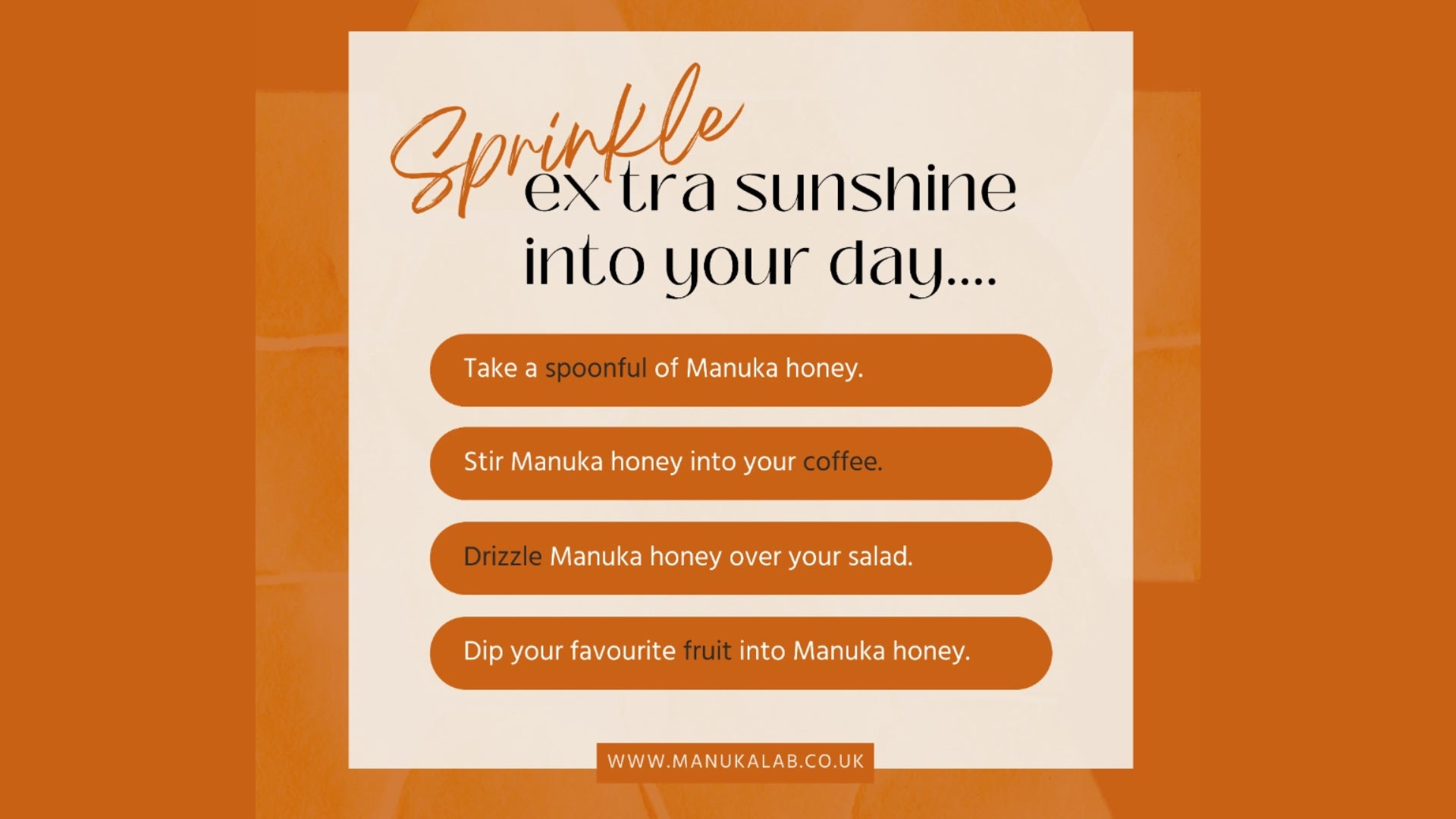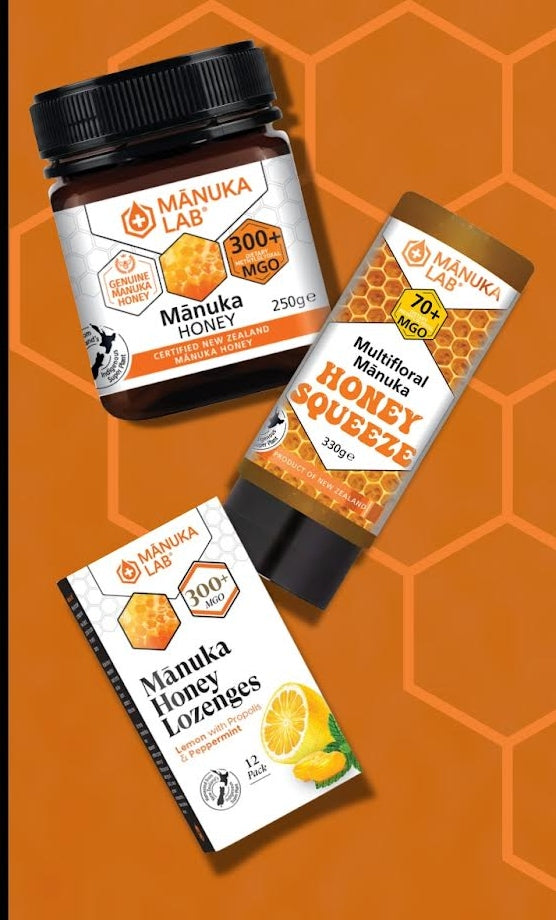

Autumn is coming, and leaves will start falling soon, which will hint at the coming of winter. The changing environment will ravage your body if you’re not careful. Your immune system should be strong, and your faculties should be sturdy. So, it is time to check in with the traditional remedy that was discovered in 1980s: Manuka Honey.
Monofloral honey, made from Manuka trees in New Zealand, Manuka honey gives traditional honey a run for its money when it comes to health benefits. This less sweet and more viscous natural nectar has gotten the attention of scientists from alternative medicine as well as the modern medicine sector. Let us discuss how Manuka honey can help you reboot your health.
But first, let us look into how it does that.
Manuka Honey - Origins and what makes it so powerful
The year is 1839. Mary Bumby, a methodist missionary, comes to New Zealand, bringing with honey bees in the first apiary she sets in the region, which happened to be surrounded by Manuka trees. The flowers were fewer, but the sweet, honeyed fragrance of the Manuka trees was plenty, which gave the honey bees another plant to pollinate. The result of this monofloral pollination was a variant of honey that was discovered in the 1980s to be more healthy, less sweet, and more powerful.
It was all thanks to Dr Peter Molan, a prominent biochemist who first encountered its antibacterial properties.
It was later researched that the following compounds play a role in making Manuka honey a good antibacterial, antibiotic, and anti-inflammation compound:
- Methylglyoxal - Also known as MGO, it is the Methylglyoxal that gives Manuka honey its antibacterial properties. It is made through the conversion of dihydroxyacetone (DHA)
- Hydrogen Peroxide - It is an agent common in most types of honey, but with Manuka honey, not only does this agent bestow antibiotic properties, but it also makes it antibacterial.
The concentration of these two chemicals is what determines the effectiveness of Manuka honey. The higher the product you choose, the more health benefits you will gain.
Great ways to use Manuka Honey to reclaim your health
Here are the top ways you can use Manuka honey to reclaim your health:
Boosting your energy levels
Do you want to boost your energy levels after you have ravaged yourself at the gym? Do you want to get access to a golden elixir of intimacy if you and your partner are trying to conceive? Manuka Honey may help.
After exercise, instead of using sugars to add to your protein shake to get that post-workout recovery, pick Manuka honey instead. Drop half a spoonful of Manuka honey over a scoop of protein powder to your protein shake, add a spoonful of peanut butter, and let the food processor do most of the work. While it won’t give you instant energy, do it enough for a longer period of time, and you will find yourself recovering faster and getting to your next task quicker.
To couples who are looking to conceive, Manuka honey is believed it may assist sperm count and motility.
Make immunity gummies for the winter season
With winter comes Christmas, and with Christmas comes a hankering for the sweet stuff. And since we all know how Manuka honey can become a good alternative to your traditional sweeteners, why not make Manuka gummies? Naturally backed with nutrients with a gummy-like texture that gives you more sweetness with every bite, you can have one (or two) daily. To make Manuka gummies,
Get 1 cup of lemon juice, 1 cup of orange juice, 3 tablespoons of Manuka honey, 3 inches of ginger, and some natural gelatine. Start by blooming your gelatine in one cup of water. Mix ginger with lemon juice before straining it to remove any pulp. Get a saucepan to low heat, add a quarter cup of water, put your bloomed gelatine in it, and wait for it to warm up. Remove the pan, add three tablespoons of Manuka honey, and start stirring. Pour the mixture into candy moulds before putting it in the fridge overnight. Depending on the site, you can make a week’s worth of Manuka gummies easily with this.
Deal with indigestion with Manuka Honey
With winter dropping your body temperature, hunger pangs become common. And since our minds can’t differentiate between what’s healthy and what’s not, everything looks good. The result: foods that ravage your stomach. A bad stomach is a breeding ground for Clostridium Difficile, and with Manuka Honey’s antibiotic properties, you can deal with them easily.
The best way to use a good quality New Zealand Manuka honey when dealing with indigestion is by mixing Manuka honey in hot (not boiling) water. Or, if you want to compound its anti-inflammatory goodness, using Manuka in green tea is also a good idea.
Using it as an antibiotic for your body
Manuka Honey has been reported to be effective against MRSA - also known as Methicillin-resistant Staphylococcus Aureus. Being one of the reasons behind some of the most difficult-to-treat infections in humans, MRSA finds the right opponent in Manuka Honey.
According to a paper by Frontiers, Manuka honey, when used in conjunction with other antibiotics, makes the antibiotics more effective.
Furthermore, the study highlighted that Manuka honey is reportedly effective against a diverse range of pathogens. Per these reports, Manuka honey is said to be “no longer” just an alternative.
Make lozenges out of Manuka Honey
Getting the sniffles will get a lot more common when winter arrives. Dealing with the sore throat will become paramount, making Manuka honey the most critical addition to your traditional remedies.
Make your own lozenges using the recipe below or order some Manuka Honey lozenges. Keep them stored inside a cool place. And whenever you feel like your throat is in trouble, one will be enough to give you relief.
Ingredients
1 cup lemon and ginger herbal tea
1 tsp lemon juice
1/2 cup white sugar
3/4 cup honey (preferably local, raw honey if available)
2 teaspoons coconut oil
- Place all ingredients into a saucepan and stir over a high heat until the sugar dissolves. Bring to the boil, then reduce to a simmer.
- Allow to boil on a gentle heat, stirring occasionally, until the mixture reaches the hard stage. The mixture could boil over if the heat is too high, so keep it on a steady simmer. If you have a thermometer, aim to reach around 140 degrees. Alternatively, test the mixture by dropping a few droplets into a glass of ice water. When it is ready, it will be hard and chewy. Once the mixture starts boiling, it takes me roughly 26 minutes to reach this stage.
- Gently pour the mixture into small moulds, silicone mats are great for a lozenge shape
- Allow the lozenges to cool and set. When hard, remove from their moulds or trays and wrap in wax paper or cling film. Alternatively, dust in icing sugar and store in a tin.
Get the right New Zealand Manuka Honey to get back your health
While the perks of Manuka honey are many, getting the right type of honey is what matters. At Manuka Lab, you will get tested New Zealand Manuka honey, which has gone through multiple checks to ensure that you get the purest of products from New Zealand to your homes.



